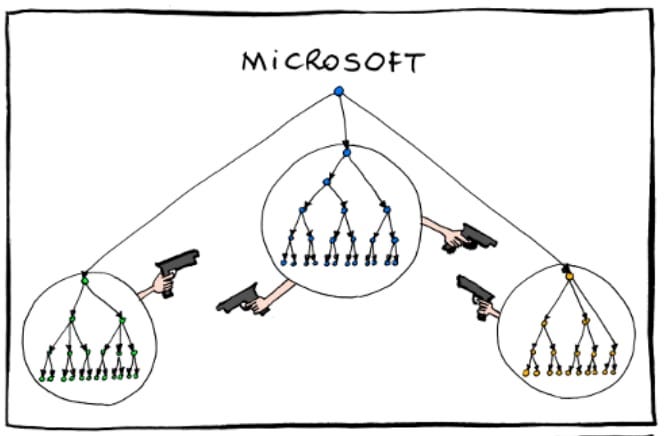The Ten Commandments of a Good CTO
- Sergio Visinoni from Sudo Make Me a CTO <makemeacto@substack.com>
- Hidden Recipient <hidden@emailshot.io>
Hi, 👋 Sergio here! Welcome to another free post from the Sudo Make Me a CTO newsletter. If you prefer to read this post online, just click the article title. As this is a free newsletter, I do immensely appreciate likes, shares and comments. That's what helps other readers discover it! The Ten Commandments of a Good CTOThe key principles a good tech executive should abide by to be successful in his role.While I consider myself an agnostic¹, I grew up in a small town in Italy, where Catholicism was part of the standard education for kids. I have therefore been exposed to most concepts, principles, and traditions of such a religion for a long time. One of them is the list of the so-called Ten Commandments, allegedly received by Moses from the hand of the Lord², as a list of key principles for probity and respectability. As I've been disgusted by the very popular trend in the land of freedom to use the catholic tradition to promote racism, bigotry, and hate, I thought I would be excused if I attempted an analogy between the Ten Commandments and some principles a good CTO should abide by. As the bar for blasphemy has now reached record levels, I do hope nobody will take this parallel as offensive or dismissive of their religion. So, let's explore the 10 commandments for a good CTO
#1 You shall prioritize the company's mission and strategic goals above all else.As a CTO, you are primarily serving your company's business objectives. While new technologies and innovative projects are exciting, they must directly serve the company's strategic roadmap and mission. You should avoid the trap of pursuing pet projects, falling victim to the shiny object syndrome, or just trying to enrich your CV with trending keywords. Every major technical decision should focus on driving tangible business value and moving the company forward. This can happen on multiple horizons, balancing short-term results with longer-term investments and bets. #2 You shall not misuse data, distort facts, or present misleading information.High integrity in communication and decision-making is fundamental for any executive, and even more so for CTOs. You must rely on accurate data (and make it available to others), no matter whether you're justifying a major investment, assessing the progress of key initiatives, or estimating technical debt. Deliberately tweaking or altering data in support of a personal agenda, while it might work in the short term, it will inevitably erode your credibility and reputation, as well as lead to poor results. You are in a unique position to promote a culture where data is respected and used as the foundation for technical decisions, no matter whether they confirm or disprove your favorite approach. #3 You shall ensure your team has time for rest, learning, and focused work.There is a reason why humans have a long tradition of alternating work with rest, one that the late-stage capitalist drive pushing for 996³ and similar abhorrent systems seems to deliberately ignore: it's the only way to make productivity sustainable. You should ensure that you and your team both follow sustainable work rhythms, avoiding the perpetual death march approach. While occasional spikes and crunches are acceptable - and sometimes even inevitable - these should be balanced by quieter periods. This isn't just about compassion, which by itself would be a strong enough reason. It's also about long-term productivity and motivation. If you kill the goose that lays golden eggs⁴, you'll be in trouble before you realize. #4 You shall respect and learn from the history and foundational decisions of your company's technology and business.Every company's current technical landscape is built upon a history of choices, compromises, and innovations that made sense at a certain point in time. As a good CTO, you will seek to understand such foundational decisions, ensuring you understand the why behind certain tradeoffs in architecture, systems, staffing, or processes. Only once you understand such historical reasons will you be able to introduce changes that will allow the company to move forward with a limited risk of repeating past mistakes or forgetting about critical dependencies. Understanding the past is necessary to build a better future. #5 You shall not knowingly implement solutions that endanger user data, privacy, or the company's security.As an executive, you have a significant responsibility when it comes to handling, respecting, and protecting your users' trust. A fundamental requirement is to rigorously protect user data, respect privacy regulations, and proactively manage security threats and vulnerabilities. This is an area in which short-term compromises and trade-offs in the name of speed of delivery can cause significant downstream issues. The sooner you introduce such systems to avoid killing your users’ trust, the cheaper it will be to implement and maintain them. #6 You shall be loyal to your team, your company's vision, and your ethical principles.No company can be functional if there isn't a high degree of loyalty that starts at the top. Loyalty here is not about committing to the company forever, sacrificing your personal life, family, and other aspects of your private life to it. It's about consistently showing a united front and doing what you're asked to do, even if you initially disagreed with the approach. It's about disagreeing in private, but agreeing in public. Not undermining the company's decisions by distancing yourself or secretly sabotaging them. This goes both ways: you owe loyalty to the people reporting to you, and never (ab)use them or their success to gain personal benefits or power. #7 You shall not appropriate intellectual property or ideas without proper attribution.You should ensure that credit is given where credit is due, be it within your company or outside. On the inside, ensure that credit for ideas and achievements is given to those who most contributed to them. Avoid, particularly, the tendency to attribute most of those merits to yourself as the leader. Make sure to publicly praise people from your team or other parts of the organization who had a significant impact. On the outside, make sure you recognise, respect, and reward the work of all the people who contribute to open source software used internally at your company. There isn't a single company in the tech industry that isn't leveraging open source software to drive its business, yet recognition of it is often missing. Furthermore, playing fairly with the open source community is not just the right thing to do, but it can also open plenty of collaboration opportunities for the future. And please, do not pretend that you'd been producing something that is clearly coming out of an LLM. That's just embarrassing. #8 You shall always communicate transparently, honestly, and with data.In other words: do not deliberately lie, and always seek to support your claims with strong arguments and data. Being honest and respectable is more important than being right or winning fights, no matter how much the public discourse these days might be hinting at the opposite. This is particularly true in your interactions with stakeholders from other areas and departments. Avoid using technical jargon and complex-sounding terms as smokes and mirrors. Speak plain language, and show evidence that helps others understand your takes, objections, or proposals. You want to build trust with people by helping them understand you, not the opposite. #9 You shall not desire or attempt to claim the credit, recognition, or praise from a peer.Do not envy the success of people around you, especially your peers in the executive team. Instead, celebrate them and seek ways to learn from their success. Being envious of another's recognition is not only an indicator of chronic insecurity, but it also discourages future collaboration. A climate of internal competition, while it might lead to some short-term benefits and results, generally ends up eroding trust and building a culture of fear. Remember the meme from the early 2010s about how Microsoft operated internally?⁵ #10 You shall not envy other companies' tech stacks, funding, or talent.As Baldur Bjarnason⁶ once told me, tech is largely a pop culture. Trends come and go, and people take up doing what Google, Amazon, Netflix, Apple, or Meta are doing, just because it sounds fashionable. Such companies benefit from a disproportionate media coverage, making them look like they're representative of the whole industry, when in fact they're more the exception than the norm. I've recently discovered that an estimated 85% of all the IT workload still runs on premises, not on the cloud⁷. Do we hear a lot about that? Not really. This is just an example to make the tenth and last commandment more concrete. In essence: do not fall for cargo culting. Definitely document yourself about what's going on in the industry, then figure out what's most appropriate for your company, where it is now. Help keep this newsletter freeI love writing this newsletter, and I intend to keep it free forever. If you want to support my work, you can engage with me in one of the following ways:
If your needs fall into a different category, such as newsletter collaborations or sponsoring, please reply to this email or schedule a free call via this link. 1 If you want to know more about what being an angostic means, here is the traditional Wikipedia link. 2 For more details about this key concept, check out this other Wikipedia link. 3 996 isn't the geographical code for calling my area. It's the most recent peak of exploitation that originated in the big tech scene in Asia and is gaining popularity more broadly. 4 In case you have never heard about the story 5 The picture is taken from a great article by Gergely Orosz covering the publication of the first book by the original author of that and many other illustrations. Recommended. 6 In case you missed the interview, you'll find it here 7 In a funny twist of events, I heard that in the Oxide and Friends podcast, where they were quoting none other than Andy Jessy, Amazon’s CEO. Even if that number might have been slightly inflated to emphasize the growth potential of AWS, it's reasonable to say that a large amount of the IT workload runs on-premises, while most of the public discourse seems to believe everybody is on a public cloud. Sudo Make Me a CTO is a free newsletter edited by Sergio Visinoni. If you found this post insightful, please share it with your network using the link below. If you or your company need help with one of the topics I talk about in my newsletter, feel free to visit my website where you can schedule a free 30 minutes discovery call. I'd be delighted to investigate opportunities for collaboration! |
Similar newsletters
There are other similar shared emails that you might be interested in:


